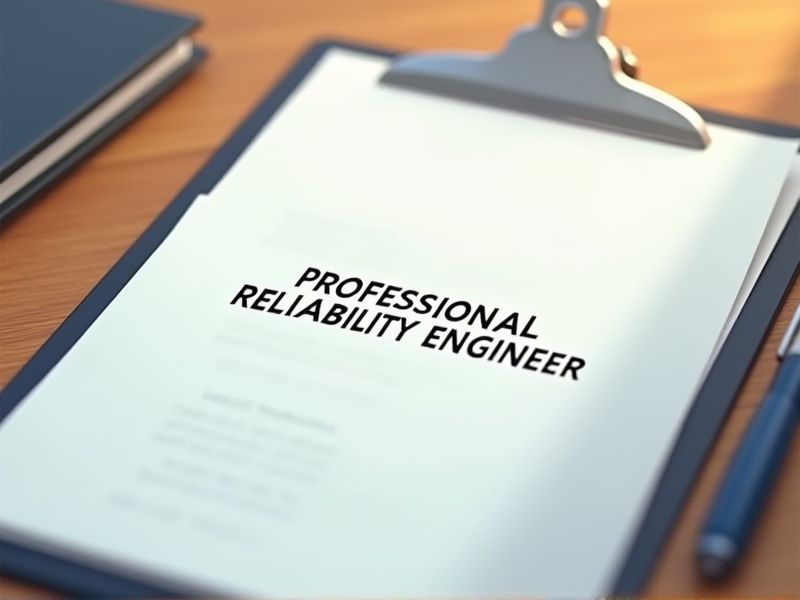
Professional reliability engineers are tasked with ensuring the dependability of systems and processes, which directly impacts operational efficiency and safety. Companies trust engineers who demonstrate their skills and knowledge through recognized credentials. Various certifications provide engineers with the latest methodologies and tools, enhancing their ability to predict and mitigate potential failures. Key certifications can significantly contribute to the expertise required in the field.
ASQ Certified Reliability Engineer (CRE)
Attaining a Certified Reliability Engineer (CRE) credential demonstrates a comprehensive understanding of reliability engineering principles, enhancing credibility in the field. Employers often seek CRE-certified professionals for their proven ability to implement effective reliability testing and prediction methodologies. CRE certification ensures familiarity with industry-standard tools and practices, improving an engineer's problem-solving efficiency. Achieving this certification typically leads to career advancement opportunities due to the recognized expertise in reducing product failures and optimizing processes.
SMRP Certified Maintenance & Reliability Professional (CMRP)
The CMRP certification provides validation of a professional's knowledge in maintenance and reliability principles, which enhances credibility in the field. When professionals hold this certification, companies often report improved asset management, given the standardized approach to maintenance practices. The certification encourages continuous learning and skill development, aligning with the evolving demands of modern engineering. Organizations recognize CMRP-certified engineers as assets in reducing downtime and operational costs, leading to more robust system reliability.
ISO 55001 Lead Auditor Certification
ISO 55001 Lead Auditor Certification equips a professional reliability engineer with skills to systematically assess and improve asset management systems, enhancing their ability to ensure operational efficiency. Holding this certification validates expertise in aligning asset management with business objectives, making the engineer a critical asset for organizational growth. With formal recognition, the engineer's credibility is boosted, fostering trust among stakeholders and facilitating cross-functional collaboration. This certification also prepares the engineer to implement best practices, reducing risks and optimizing resource utilization effectively.
Reliability Centered Maintenance (RCM) Certification
Reliability Centered Maintenance (RCM) Certification provides engineers with a structured framework to identify and mitigate failure modes, enhancing equipment reliability and performance. This certification equips professionals with the skills to balance maintenance strategies, resulting in optimized operational efficiency and reduced downtime. With RCM knowledge, engineers can implement proactive maintenance tactics that align with safety and regulatory standards, minimizing unforeseen risks. Companies value engineers with RCM Certification as it signifies a commitment to up-to-date best practices in maintenance management, contributing to cost-effective asset lifecycle management.
Failure Modes and Effects Analysis (FMEA) Certification
A Failure Modes and Effects Analysis (FMEA) certification provides professional reliability engineers with a structured methodology to systematically identify potential failure modes in a system or process. The certification enhances their ability to evaluate the risk associated with different failure modes by analyzing their effects and prioritizing them for mitigation. Employers often seek certified professionals as they bring standardized skills essential for increasing product reliability and safety. Certification often leads to improved problem-solving capabilities, ultimately reducing costs associated with unexpected failures and increasing customer satisfaction.
Root Cause Analysis (RCA) Certification
A Root Cause Analysis (RCA) Certification equips a professional reliability engineer with structured methodologies to identify and address the underlying causes of failures, leading to more effective problem-solving. Companies recognize certified individuals as better equipped to enhance system reliability and reduce downtime, which lowers operational costs. As industries increasingly emphasize preventative measures over reactive approaches, possessing RCA credentials becomes crucial in positioning engineers for career advancement. Certification also provides assurance of a standardized skillset, increasing the engineer's credibility and trustworthiness in cross-functional teams.
Lean Six Sigma Green Belt Certification
Lean Six Sigma Green Belt Certification equips professional reliability engineers with statistical tools to enhance process efficiency and ensure consistent quality outcomes. By understanding these methodologies, engineers can effectively identify and eliminate waste, leading to improved reliability of systems and components. The certification provides a structured approach to problem-solving, which is crucial in predicting and preventing failures in engineering contexts. Achieving this certification denotes a commitment to continuous improvement and can enhance career opportunities within engineering sectors by aligning with industry standards for operational excellence.
Lean Six Sigma Black Belt Certification
Lean Six Sigma Black Belt Certification equips reliability engineers with advanced statistical tools, helping them identify and mitigate process inefficiencies, directly leading to increased system reliability. It fosters a deep understanding of process optimization techniques, which enhances the engineer's ability to prolong asset life and reduce maintenance costs. Mastery of data-driven decision-making methods from the certification empowers engineers to predict and prevent failures more accurately. This certification also signifies a commitment to quality and continuous improvement, boosting professional credibility and career advancement opportunities.
ASQ Certified Quality Engineer (CQE)
A Professional Reliability Engineer benefits from the ASQ Certified Quality Engineer (CQE) certification because it enhances their understanding of quality principles and statistical methods crucial for ensuring product reliability. The certification deepens knowledge in process improvement, a critical component for reducing failures and increasing the lifespan of products. Holding the CQE credential signals proficiency in quality management practices, which are integral to identifying and mitigating potential reliability issues. The standardized approach taught in the CQE program aids in developing robust systems that align with organizational goals for product dependability.
Certified Maintenance & Reliability Technician (CMRT)
Certified Maintenance & Reliability Technician (CMRT) certification ensures that professionals possess a verified understanding of maintenance and reliability best practices, directly enhancing their practical skills. This certification provides reliability engineers with a standardized assessment of competency, influencing higher confidence from employers in their technical abilities. As technology and equipment become more complex, CMRT-certified individuals are better equipped to implement strategies that minimize downtime and maximize efficiency. In turn, reliability engineers working alongside CMRT-certified technicians can develop and execute more effective maintenance programs, improving asset performance and lifespan.
Summary
As a professional reliability engineer, obtaining certifications can enhance your credibility and expertise in the field. The certifications provide structured knowledge, potentially improving your problem-solving skills and methodologies. Employers may recognize your qualifications with increased trust and better career opportunities. Furthermore, certifications can broaden your network, connecting you with other industry experts and resources.
